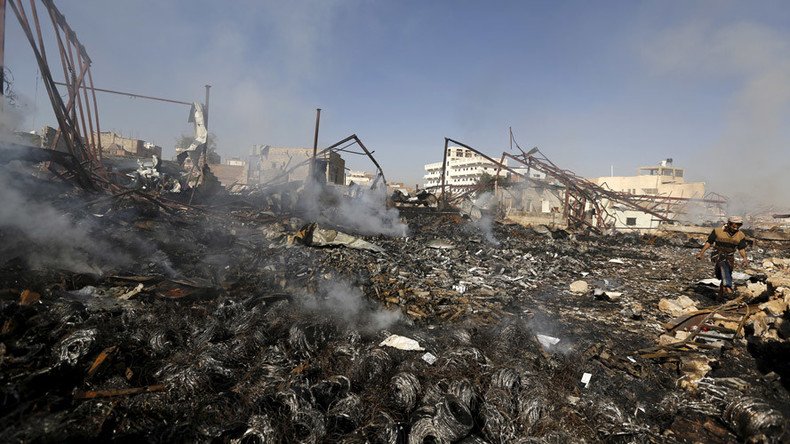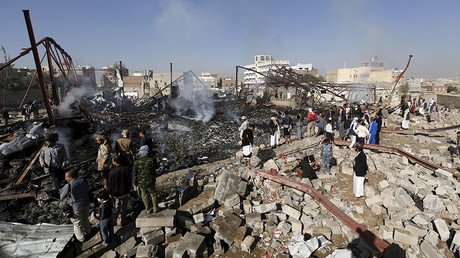UN ‘conservative estimates’ show 700 children among 6,000 Yemen fatalities

The UN will launch a humanitarian drive to raise some $1.8 billion required to save millions of people from humanitarian catastrophe in Yemen, where over 6,000 people have been killed since the Saudi-led coalition intervention in March 2015.
In a briefing to the 15-nation United Nations Security Council, Stephen O’Brien, the UN Under-Secretary-General for Humanitarian Affairs, announced that on Thursday the Yemen Humanitarian Response Plan will be launched in Geneva.
The plan aims to raise $1.8 billion to cover the “most critical and prioritized needs” that includes food for nearly nine million people. The money will also be used for water and sanitation for some 7.4 million people and medical treatment for 10.6 million people.
At #UNSC, @UNReliefChief O'Brien spotlights need to end ‘human catastrophe’ in #Yemenhttps://t.co/QPvYyhYEd4pic.twitter.com/A04bjQXzQ7
— UN News Centre (@UN_News_Centre) February 16, 2016
Highlighting the urgent need for the Security Council to take greater measures to protect civilians, O'Brien said that the UN should insure that people have a chance to survive.
“Some 2.7 million people have had to flee their homes. At least 7.6 million people are severely food insecure. Some two million acutely malnourished children and pregnant or lactating women need urgent treatment,” he told the UNSC.
He noted that since the escalation of the conflict in March 2015 which has involved Saudi-led bombings, over 6, 000 people have been killed.
“More than 35,000 casualties, including over 6,000 deaths, have been reported by health facilities across the country,” since last March, O'Brien said, adding that UN has confirmed that out of that number, 2,997 were civilians deaths, in addition to 5,659 that were injured as the result of the hostilities.
Of great concern to the UN is the fate of the children in the conflict. O'Brien said that “conservative estimates” suggest that over 700 children have been killed and over 1,000 more injured. He also noted that as many as 720 children have been documented as having been forcibly recruited as child soldiers by the warring parties. The diplomat also noted that some 1,170 schools have been closed leaving some 3.4 million minors out of education.
The destruction or closure of health facilities, which totals some 600 since March, has also left some 14 million Yeminis in desperate need of medical attention.
Noting that on Sunday Saudi-led coalition airstrike struck a building 200 meters away from UN and diplomatic personnel facility, he urged all parties in Yemen to protect civilians.
“The parties to the conflict have a duty of care in the conduct of military operations to protect all civilian persons and objects, including humanitarian and health care workers and facilities, against attack,” Mr. O’Brien said, reminding all parties of their obligations under international humanitarian law to "facilitate humanitarian access to all areas of Yemen,” he said.
At the same time, O'Brien noted that for the past two weeks Saudi Arabia has continued to impede the work of UN staff in the country, “causing delays to important missions.” The diplomat said that Riyadh is also blocking sea access to Yemen's ports, and is preventing aid from traveling around the country,
“Access to northern Governorates where needs are among the most severe in the country also continue to be challenging due to relentless conflict, including airstrikes – in particular to communities along the border with Saudi Arabia where conflict is intense,” O'Brien noted.
Tensions in Yemen escalated after Shia President Saleh was deposed in 2012 and his Houthi supporters, reportedly aided by Iran, eventually seized the capital city Sana’a last year. Houthi forces then advanced from Sana’a towards the south, seizing large parts of Yemen, and sending the current Sunni President Abd-Rabbu Mansour Hadi into exile.
In late March, a Saudi Arabian-led coalition responded with airstrikes in order to stop Houthi advances and reinstate Hadi back in power. By late summer, the Saudi-led forces had started a ground operation, which so far is stuck in a stalemate.













